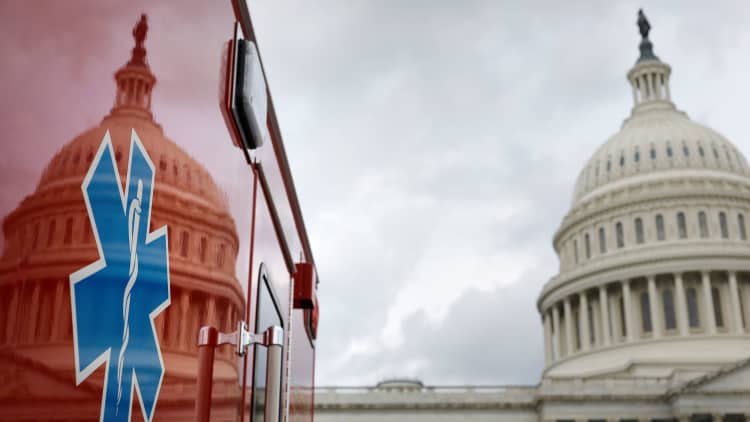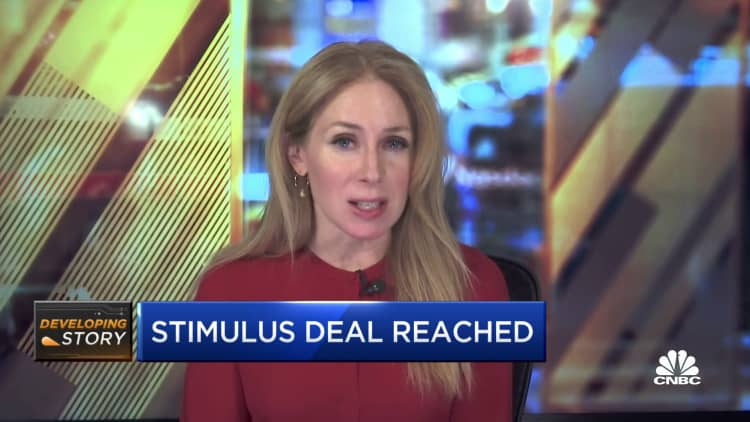
Unemployed workers would get an extra 11 weeks of jobless benefits and a $300 weekly enhancement to aid payments as part of a Covid relief deal Congress reached Sunday.
Certain self-employed and gig workers would also get an extra $100 a week.
The 11-week timeline is less than the amount offered by a bipartisan package released earlier this month. That bill would have paid extended and enhanced benefits for 16 weeks, to mid-April.
In all, the $900 billion compromise package, the result of frenzied negotiations ahead of a year-end benefits cliff for millions of workers, offers $120 billion in additional unemployment benefits.
There are more than 20 million Americans collecting unemployment benefits, according to the Labor Department.
$300 weekly enhancement
The $300 boost is available to all workers receiving unemployment benefits, like the prior $600 weekly supplement provided by the CARES Act that lapsed in July.
The subsidy, which comes on top of the aid workers receive each week, is not retroactive. It is available from Dec. 26 through March 14.
PUA and PEUC extended
The legislation would also extend two programs created by the CARES Act: Pandemic Unemployment Assistance, which pays benefits to self-employed, gig, freelance and part-time workers generally ineligible for state unemployment insurance; and Pandemic Emergency Unemployment Compensation, which pays extra weeks of benefits to individuals who exhausted their state benefits.

The legislation would extend these programs by 11 weeks, to mid-March, allowing individuals to receive a maximum 50 weeks of benefits.
Both programs are set to expire this weekend. Even if the legislation becomes law, there will likely be at least a short gap in benefits for many of the 14 million people receiving aid through them.
Individuals receiving benefits through the programs as of March 14 could continue receiving aid through April 5 as long as they haven't yet hit the 50-week maximum.
$100 boost for the self-employed
Certain "mixed earners" — meaning they have both wage (i.e., W-2) and self-employment (i.e., 1099) income — will be eligible for an additional $100 a week. The stipend would be on top of the $300 weekly boost and last until March 14.
The $100 supplement would be available to individuals who make at least $5,000 a year in self-employment income but are disqualified from PUA because they receive state unemployment insurance.
Many such individuals are receiving unemployment benefits at a low level because of how their benefits have been calculated by states, which don't account for self-employment income.
Overpayments
The relief bill also offers a relief valve for self-employed workers asked to repay PUA payments they've received in error since the spring. Such overpayments could amount to thousands or tens of thousands of dollars, and workers may have long ago spent those funds.
The CARES Act didn't provide a way for states to waive these federal payments, as they can with state benefits.
More from Personal Finance:
Pain, despair and poverty reach fever pitch for unemployed workers
Even some millionaires are cutting back on holiday spending due to Covid
Debt held by oldest households grew 39% over last decade
The relief bill lets states dismiss overpayments if the individual was not at fault and repaying funds would cause financial hardship.
The bill offers the same overpayment protection for Lost Wages Assistance, a Trump administration program that offered $300 a week of extra federal benefits for up to six weeks starting in August.
New documentation requirements
The legislation creates new documentation requirements for PUA recipients.
After Jan. 31, new applicants must substantiate self-employment within 21 days. That deadline can be extended for individuals who show good cause. Individuals already receiving PUA as of Jan. 31 must provide such documentation within 90 days.
States must also put procedures in place to verify the identity of program applicants. States have been combating high levels of fraud through the PUA program in recent months.
This is a developing story. Check back for updates.


